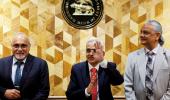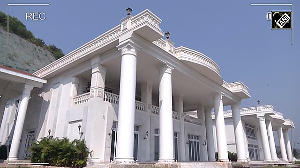Sanjay Malhotra takes charge as the 26th RBI governor at a time when headline retail inflation has shot up to 6.2%.

Sanjay Malhotra is the first Reserve Bank of India governor since Duvvuri Subbarao to transition directly from North Block, where the finance ministry is located. Malhotra will assume office on Wednesday.
A 1990 batch Indian Administrative Service officer from the Rajasthan cadre, Malhotra will succeed Shaktikanta Das, who retired as finance secretary before becoming India's G20 Sherpa. Subbarao was the finance secretary immediately before taking over as RBI governor.
Malhotra takes office at a time when headline retail inflation has shot up to 6.2 per cent, above the monetary policy committee's (MPC's) tolerance band, while India's gross domestic product growth slowed to 5.4 per cent for the July-September quarter.
Consequently, in the December monetary policy review, the RBI raised its inflation projection for 2024-2025 to 4.8 per cent from 4.5 per cent and reduced the growth forecast to 6.6 per cent from 7 per cent.
What will Malhotra prioritise: Growth or inflation?
At this juncture, the key question is whether Malhotra will prioritise growth or inflation.
Many believe the December policy sets the stage for a rate cut in the next review.
Two of the three external members of the MPC voted for a 25-basis point (bp) rate reduction in the December meeting.
"We think the new RBI governor will need to balance growth risks and recent headline Consumer Price Index inflation, which remains well above the RBI's medium-term target of 4 per cent," said Tanvee Gupta Jain, chief India economist at UBS Securities.
"The balance of risks is tilting towards weaker growth, especially with the potential for a US tariff hike on China becoming more likely," Jain added.
"A high real policy rate and softening growth could create room for the RBI to lower the repo rate by 75 bps starting in February 2025."
RBI's focus should be core inflation
There is growing clamour for revising the inflation-targeting framework by excluding food inflation.
Proposed by the chief economic advisor in this year's Economic Survey, many in the government believe the RBI should focus on core inflation -- headline inflation excluding fuel prices. Recent inflation upticks have been largely driven by food prices.
Outgoing governor Shaktikanta Das strongly opposed excluding food from the framework.
'The fact is that our target is headline inflation, in which food inflation accounts for about 46 per cent. Given this large share of food in the consumption basket, food inflation pressures cannot be ignored,' Das said during the August monetary policy review.
'The public understands inflation mainly in terms of food prices, rather than other components of headline inflation,' he added.
The flexible inflation targeting framework is reviewed every five years, with the next review scheduled for 2026. The market will eagerly await Malhotra's stance on this issue.
Cryptocurrencies: A growing concern
Das expressed strong opposition to cryptocurrencies, citing their risks to financial stability and the potential for central banks to 'lose control over the money supply in the economy'.
'I believe cryptocurrencies should not dominate the financial system due to the risks they pose to financial and monetary stability, as well as the banking system,' Das said in October.
While some advocate for regulating cryptocurrencies, the central bank has remained opposed to allowing their widespread use.
Bitcoin recently crossed the $100,000 mark, partly fired by hopes that Donald Trump, the incoming US president, will announce measures to deregulate cryptocurrencies. Trump plans to make the US the global cryptocurrency capital.
Malhotra's view on this issue remains unclear.
Imposing business restrictions on errant entities
During Das' tenure, the RBI began imposing business restrictions on erring entities, in addition to monetary penalties.
Several banks and non-banking financial companies received 'cease and desist' orders, a move that was strongly opposed by the industry.
It remains to be seen whether Malhotra will adopt a similarly tough stand on regulated entities.
Industrial houses as bank promoters
In 2020, an Internal Working Group recommended allowing large corporate or industrial houses to become promoters of banks, subject to necessary amendments to the law.
Under Das, the RBI did not accept this suggestion. It will be interesting to see Malhotra's position on this issue.
Feature Presentation: Rajesh Alva/Rediff.com












 © 2025
© 2025